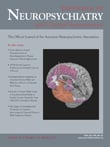To the Editor: A 75-year-old married man, with 5 years of education, presented in October 2008 for subjective memory difficulties started in the previous year. In 1966, the patient had a severe brain injury due to a fall while working as a carpenter. He reported that after the brain injury he had rapidly returned to his level of cognitive efficiency. Neurologic exam and biochemical exam were negative; neuroradiologic examination with CT revealed an area of hypodensity in the right anterior frontobasal region, involving the orbitofrontal and mesial gyrus and the inferior border of the superior frontal gyrus.
He revealed that during the last year he had begun to suffer sexual behavioral disturbances: he described himself as sexually inactive due to an erectile dysfunction but reported that when he was alone and encountered younger women, he felt a strong sexual desire and he was unable to stop himself from approaching them to make sexual advances. He also reported frequent intrusive thoughts about sexuality. He reported feeling stressed and ashamed by these impulsive behaviors because they were against his moral principles and habits, which he described as very rigorous. He was a religious man and involved in several charity works of his parish.
These clinical symptoms were compatible with a DSM-IV-TR-based diagnosis of impulse control disorder, and they were also compatible with recently proposed operational diagnostic criteria of pathologic hypersexuality,
1 which include the following criteria:
A. The sexual thoughts or behaviors are excessive or an atypical change from baseline (in this case by maladaptive preoccupation with sexual thoughts).
B. The behavior must have persisted for at least 1 month.
C. The behavior causes marked distress and attempts to control thoughts or behavior are unsuccessful.
D. The behavior does not occur exclusively during periods of hypomania or mania.
Neuropsychiatric assessment revealed a mild depression (Geriatric Depression Scale score=11/15) and a level of impulsivity within normal range (Barratt Impulsiveness Scale score =65).
Neuropsychological evaluation revealed a preserved cognitive functioning (memory, language, attention, abstract reasoning, visuospatial skills, constructional praxis). Executive function assessment revealed a preserved performance in the Frontal Assessment Battery, a mild interference effect in the Stroop test and a pathological score in the bizarreness scale of the Cognitive Estimation Task. We also administered the Iowa Gambling Task,
2 a decision-making task deemed to be sensible to orbitofrontal cortex functioning. Even if the patient reported a positive total score (+6), he was unable to develop an advantageous decision strategy during the task (partial scores in the five blocks of 20 choices: 2, 4, 0, 0, 0).
Sexual behavior of this patient, even if started several years after the prefrontal injury, is in line with previous studies that reported inappropriate control of sexual impulses in patients with orbitofrontal damages,
3 especially in the right hemisphere.
4 Studies also confirm the role of prefrontal systems in sexual behavior
5,
6 and underline the role of the right prefrontal cortex in self-control, as shown by the inability to alter choice behavior toward less risky and more long-term advantageous decks while performing the Iowa Gambling Task.

